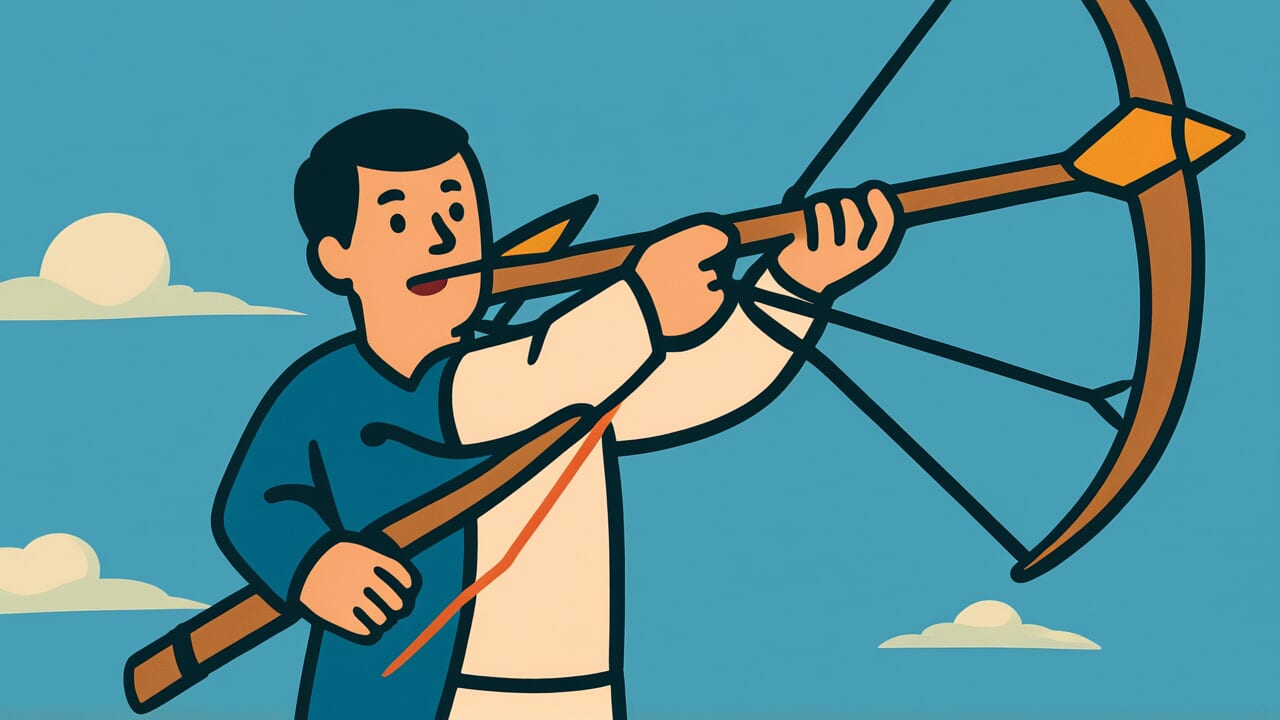How to Read “Holding a bullet to invite a bird”
Dan wo torite tori wo maneku
Meaning of “Holding a bullet to invite a bird”
“Holding a bullet to invite a bird” is a proverb that describes using the wrong method and achieving the exact opposite of your intended goal.
This proverb is used when someone’s actions clearly contradict their purpose.
For example, wanting to gain someone’s trust but taking an aggressive attitude. Or wanting to save money but repeatedly making impulse purchases. Or wanting to be healthy but continuing an irregular lifestyle.
The person thinks they’re working toward their goal, but they’re actually doing things that push them further away. This expression points out that ironic situation.
Even today, we sometimes unknowingly act like we’re “holding a bullet to invite a bird.”
Even if your goal is right, you won’t get the results you want if you use the wrong methods. This proverb teaches us the importance of always checking that our goals and methods match.
Origin and Etymology
There are various theories about the clear origin of this proverb. However, it likely comes from ancient Chinese classics.
“Dan” means bullet, a tool for shooting stones or balls. “Toru” means to hold in your hand.
Looking at the structure of the phrase, this proverb depicts someone trying to catch a bird.
Normally, if you want to catch a bird, you should quietly approach and set a net. Or silently ready your bow and arrow.
But this person is deliberately holding a bullet in their hand. They’re showing it off while inviting the bird to come closer.
The bird naturally senses danger and flies away. The person’s actions are completely counterproductive to their goal of catching it.
This comically contradictory behavior sharply exposes human foolishness.
In ancient China, hunting skills were crucial knowledge directly connected to survival.
From such practical wisdom, this proverb was likely born as a lesson pointing out contradictions in human behavior.
It expresses a timeless pattern of human failure through a concrete hunting scene. The mismatch between purpose and method.
Usage Examples
- He says he wants to motivate his subordinates, but he only scolds them every day. It’s exactly like holding a bullet to invite a bird
- Eating sweets to relieve stress while on a diet is like holding a bullet to invite a bird, and I know it myself
Universal Wisdom
The proverb “Holding a bullet to invite a bird” has been passed down for so long because it points out a fundamental human contradiction.
We pride ourselves on being rational beings. But in reality, we confuse purpose and method surprisingly often.
Why do people take such contradictory actions? It stems from our tendency to be swept away by immediate emotions and desires.
Even when we understand the right method intellectually, emotions like impatience, anxiety, and anger cloud our judgment.
We try to rush results and end up taking detours. Our strong desire to move someone leads to actions that push them away instead.
This proverb reveals the deep gap between “intention” and “result” in human behavior.
Even with good intentions, wrong methods bring bad results. Having the right purpose alone is not enough.
Our ancestors saw through this human weakness. That’s why they used such a clear, almost comical metaphor.
Showing off a bullet while trying to catch a bird. They rang this alarm bell for us.
It teaches a simple but easily forgotten truth. Achieving your purpose requires calmness and objectivity.
When AI Hears This
Showing a bullet to call a bird represents a fatal mistake in game theory terms.
It’s voluntarily abandoning “information asymmetry.” Normally, the hunter gains advantage by hiding their weapon as information.
But the moment they show the bullet, the bird gains information it shouldn’t have. “This human is targeting me.”
What’s interesting is that this is the reverse pattern of “costly signaling.”
Costly signaling is a strategy where you deliberately pay a high cost to show your seriousness or ability.
For example, peacocks have large tail feathers as proof. “I’m strong enough to survive even while being this conspicuous.”
But showing the bullet means paying a cost to announce “I’m targeting you.” Yet you give the target time to escape.
It’s a double failure. Using high cost to spread information that disadvantages yourself.
The same structure appears in modern business negotiations. If you show too much enthusiasm in acquisition talks, saying “I really want this company,” the other side raises the price.
If you reveal detailed personal information on social media, the risk of it being exploited increases.
Once disclosed, information cannot be taken back. This proverb has been warning about the value of information advantage for over 2,000 years.
Lessons for Today
This proverb teaches us the importance of having the courage to stop and look back.
In our busy daily lives, we tend to feel reassured just by “doing something.” But do those actions truly lead to the results we want?
What matters is developing a habit of regularly reviewing your actions.
Are today’s actions really bringing you closer to your goals? Do you want to improve your relationship with someone, but are you actually saying or doing things that push them away?
Do you want to be healthy, but are you continuing opposite lifestyle habits?
And if you notice you’re acting like “holding a bullet to invite a bird,” that’s a chance to grow.
You don’t need to be embarrassed. Everyone sometimes takes the wrong path. What matters is having the flexibility to correct your course when you notice.
What is your purpose? And are your actions today moving straight toward that purpose?
By asking yourself this question from time to time, your life should become more fruitful.
Matching purpose and method is the shortest path to success.



Comments